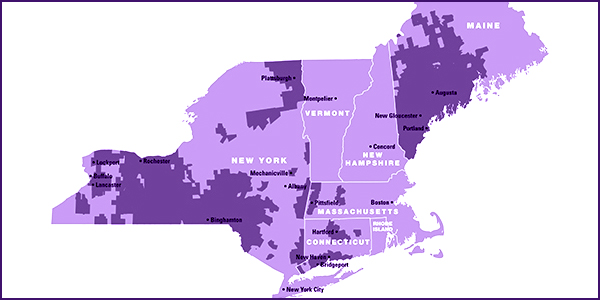By Holden Mann
FERC last week accepted a $450,000 settlement between the Northeast Power Coordinating Council and three Avangrid utilities for violations of NERC transmission operations (TOP) standards. The commission indicated in a notice last week that it would not review the penalty (NP20-4).
According to a Notice of Penalty filed Nov. 26, the violations involving New York State Electric and Gas and Rochester Gas & Electric took place Nov. 17-28, 2017, while the Central Maine Power violation occurred Jan. 11, 2019. Both situations posed a moderate risk to the reliability of the bulk power system, though neither is known to have caused actual harm.
In the first violation, a server failed, affecting a transmission network analysis (TNA) tool used by both NYSEG and RG&E for several monitoring and assessment applications. A backup server also failed, leaving the TNA tool inoperative. As a result, both utilities were unable to perform real-time assessments every 30 minutes as required by the TOP-001-3 standard.
Initially both utilities were unaware of the TNA failure and loss of monitoring and assessment capabilities, but at 1 a.m. — six hours after the incident began — the RG&E system operator discovered the breakdown and notified his counterpart at NYSEG. Neither operator notified reliability coordinator NYISO, which could have performed a real-time assessment. The server failure was not corrected until nearly four hours later, when monitoring and assessment capabilities returned. NYISO was not notified for more than 14 hours after the utilities became aware of the failure.
“The RC would not necessarily be aware that it may have to take support actions to address the lack of NYSEG/RG&E monitoring and assessment capabilities,” NERC said in its filing. “The risk posed is that if a system event occurred during this time frame, neither RG&E, NYSEG nor NYISO would have had the necessary situational awareness to respond.”
CMP’s violation of TOP-001-4 was similar, involving an accidental interruption of connectivity that led to the failure of a state estimator and a real-time contingency analysis tool. The outage lasted more than an hour, during which time CMP did not notify ISO-NE of the loss or request the RC perform a real-time assessment on its behalf. ISO-NE was informed of the outage after connectivity had returned and the tools were functional again.
In both cases, NPCC faulted the utilities for “lack of effective management oversight, including training,” with NYSEG and RG&E also criticized for lack of controls that would have detected the failure of monitoring and assessment capabilities. NPCC said the penalty was increased by an unspecified amount because CMP was already aware of the earlier incidents at the time of the January failure and hence should have known the importance of ensuring that the RC was notified and real-time assessments continued.
NPCC credited Avangrid for being cooperative throughout the enforcement process and accepting responsibility for the violations. The regional entity noted that the risk to the grid was moderate. NYSEG, RG&E and CMP have also implemented several mitigating measures, including hardware and software changes to detect faults with the reporting system, additional system operators, and new methodologies for training and staffing.
As a result, NERC’s Board of Trustees Compliance Committee approved the penalty as “appropriate for the violations and circumstances at issue.”





